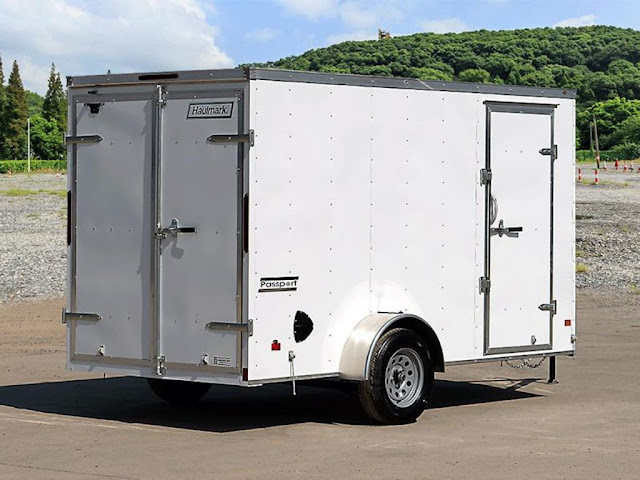Utility Trailers vs. Enclosed Trailers: What’s the Difference?
When it comes to hauling equipment, supplies, or even vehicles, choosing the right trailer is essential. Two of the most common trailer types used by contractors, landscapers, farmers, and homeowners alike are utility trailers and enclosed trailers. But how do they differ, and which one is right for your needs?
In this comprehensive guide, we'll explore the key differences between utility trailers and enclosed trailers, highlight their pros and cons, and help you make an informed choice. Whether you’re browsing utility trailers for sale or considering used enclosed trailers for sale, understanding the distinctions can save you time, money, and frustration.
What Are Utility Trailers?
Utility trailers are open trailers with flat platforms used for transporting a wide variety of items. These trailers typically have short rails around the sides, a simple gate or ramp, and are easy to load and unload. Utility trailers come in various sizes and styles to accommodate different needs.
Common Uses:
Landscaping and lawn equipment
Construction materials
ATVs and small vehicles
Household items during moves
Advantages of Utility Trailers:
Affordability: Generally more budget-friendly than enclosed trailers.
Easy Access: Quick and convenient loading and unloading.
Lightweight: Easier to tow and often more fuel-efficient.
Visibility: Easier to see your load and monitor it during transit.
Disadvantages:
Weather Exposure: Items are vulnerable to rain, sun, and wind.
Security: Open design makes it easier for items to be stolen or damaged.
When looking for utility trailers for sale, it’s important to consider the trailer’s size, weight capacity, and intended use.
What Are Enclosed Trailers?
Enclosed trailers are completely covered and feature walls, a roof, and a locking door or ramp. They provide a secure, weather-protected environment for your cargo. These trailers are popular among businesses that need secure transport for tools, products, or expensive equipment.
Common Uses:
Transporting motorcycles, bikes, or classic cars
Moving expensive tools or commercial equipment
Hauling materials that need protection from weather
Mobile workshops or storage units
Advantages of Enclosed Trailers:
Weather Protection: Shields cargo from rain, snow, sun, and wind.
Security: Lockable doors provide enhanced theft protection.
Versatility: Can be used for hauling, storage, or even as mobile workspaces.
Better Branding: Businesses can use the trailer exterior for logos or advertisements.
Disadvantages:
Higher Cost: Typically more expensive than utility trailers.
Heavier: Requires more towing power and consumes more fuel.
Limited Visibility: Harder to monitor the load during travel.
Those looking for a budget-friendly option might consider used enclosed trailers for sale, which often provide excellent value.
Key Differences at a Glance
| Feature | Utility Trailers | Enclosed Trailers |
|---|---|---|
| Design | Open platform | Fully enclosed with walls and roof |
| Protection | Exposed to elements | Weather- and theft-protected |
| Cost | More affordable | Generally higher in price |
| Weight | Lightweight, easier to tow | Heavier, requires more power |
| Usage Flexibility | Great for general hauling | Ideal for secure and sensitive loads |
| Security | Low security | High security with lockable doors |
Which One Should You Choose?
The choice between a utility trailer and an enclosed trailer depends on your specific needs, budget, and preferences.
Choose a Utility Trailer If:
You need an affordable, lightweight trailer for general hauling.
You frequently load and unload large or oddly shaped items.
You don’t need weather or theft protection.
Choose an Enclosed Trailer If:
You haul valuable or weather-sensitive cargo.
You want additional security and protection.
You use the trailer for business purposes and mobile work.
For example, a landscaping business might use utility trailers for transporting lawn equipment but switch to an enclosed trailer for expensive tools or supplies during rainy seasons.
Tips for Buying the Right Trailer
Define Your Purpose: What will you haul most frequently?
Set a Budget: Factor in cost of the trailer, maintenance, and towing equipment.
Check Towing Capacity: Ensure your vehicle can handle the trailer’s weight.
Inspect the Frame and Axles: Especially for used models.
Buy from a Trusted Dealer: A reputable dealer ensures quality and support.
Whether you’re exploring utility trailers for sale or seeking used enclosed trailers for sale, these tips will help you make a smarter investment.
Conclusion: Why Buy From True Value Trailers & Power Equipment
At the end of the day, choosing between a utility trailer and an enclosed trailer is about finding the right tool for the job. Both have their strengths, and the right option depends on how and where you plan to use it.
That’s where True Value Trailers & Power Equipment makes a difference. We offer a wide selection of utility trailers for sale, as well as used enclosed trailers for sale, all backed by expert advice and unmatched customer service. Whether you need something basic or highly specialized, we help you find the perfect trailer to meet your goals and budget.
Visit True Value Trailers today and discover why customers across the region trust us for their hauling needs. Quality, reliability, and customer satisfaction are what set us apart.



Comments
Post a Comment